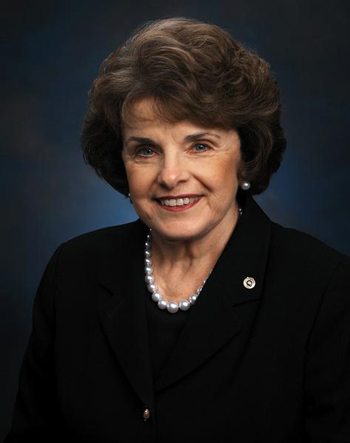November 19, 2019 - Washington - Senator Dianne Feinstein and Congressman Jared Huffman (both D-Calif.) and nine members of Congress on Monday called on the National Oceanic and Atmospheric  Administration to reconsider steps it has taken to authorize the use of harmful longlines off the West Coast.
Administration to reconsider steps it has taken to authorize the use of harmful longlines off the West Coast.
Longlines, which have been banned in California waters since 1989, can unintentionally catch or kill endangered marine species. Instead of advancing sustainable options that yield higher quality catch, the Trump administration is proposing to expand the use of outdated, more-destructive longlines on the West Coast that are worse for the fishery overall.
“Authorization of a California-based longline fishery would be a step backward in the Pacific Fishery Management Council’s longstanding commitment to making meaningful progress toward reducing bycatch within U.S. West Coast fisheries,” the members wrote.
The members continued, “Sustainably growing the buoy gear fishery while continuing to explore other highly selective alternatives to longlines would help to achieve the council’s goal of promoting a vibrant West Coast swordfish fishery with minimal bycatch.”
In addition to Senator Feinstein and Representative Huffman, the letter was signed by Senator Jeff Merkley (D-Ore.), Kamala D. Harris (D-Calif.), and Ron Wyden (D-Ore.) and Representatives Alan Lowenthal (D-Calif.), Ted Lieu (D-Calif.), Jackie Speier (D-Calif.), Peter DeFazio (D-Ore.), Julia Brownley (D-Calif.) and Nanette Diaz Barragán (D-Calif.).
Full text of the letter follows:
November 18, 2019
Mr. Barry Thom
Administrator, Northwest Region
NOAA Fisheries
7600 Sand Point Way, NE, Bldg 1
Seattle, WA 98115-0070
Dear Administrator Thom:
We write to oppose authorization of shallow-set pelagic longlines as a permitted gear under the West Coast Highly Migratory Species fishery management plan. We understand the Pacific Fishery Management Council will be discussing initial steps towards authorization at the Council’s November 19 meeting and that NOAA may be supportive of this action.
In 2004, the Department of Commerce under the George W. Bush administration determined that authorizing a longline fishery in the waters adjacent to the West Coast would have materially adverse impacts on living marine resources, including species listed under the federal Endangered Species Act. The Commerce Department found that ending the prohibition on longlining “would appreciably reduce the likelihood of survival and recovery in the wild of loggerhead sea turtles,” while extending the prohibition “minimizes potential bycatch of fish and protected species, and reduces fishery competition problems.” These conclusions resulted in the decision to maintain the long-standing prohibition on longlining, first initiated by the State of California in 1989.
Authorization of a California-based longline fishery would be a step backward in the Pacific Fishery Management Council’s longstanding commitment to making meaningful progress toward reducing bycatch within U.S. West Coast fisheries. Data from the existing Hawaii-based shallow set longline fleet are very concerning. For example, since 2007, the Hawaii fishery has discarded 46 percent of its catch on average – a level of waste significantly higher than the average across all U.S. fisheries. Furthermore, bycatch rates have increased for the past three years.
Moreover, 177,000 sharks and rays have been caught over the past eleven years in the Hawaii-based fishery, rivaling the number of swordfish that are landed for commercial sale. Hundreds of protected seabirds have also been caught over this same period, hindering the recovery of species like the imperiled short-tailed albatross. This fishery threatens to prevent recovery of the critically endangered Pacific leatherback sea turtle and endangered Pacific loggerhead sea turtles. Finally, from 2012-2016, the Hawaii-based longline fishery caught and discarded more than 2,700 striped marlin, blue marlin, and shortbill spearfish – a number that is only likely to go up in the event a West Coast-based longline fishery is authorized.
As such, authorization of longlining would be inconsistent with Congress’s intent when it amended the Magnuson-Stevens Fishery Conservation and Management Act to require that “conservation and management measures shall, to the extent practicable, (A) minimize bycatch and (B) to the extent bycatch cannot be avoided, minimize the mortality of such bycatch” in U.S. fisheries.
We understand that NOAA Fisheries may be pursuing longline authorization in order to enhance domestic fisheries production, with an eye toward increased exploitation of “underutilized” stocks. However, far from being underutilized, some highly migratory species stocks, such as Pacific bluefin tuna, Eastern Pacific swordfish, and Eastern Pacific yellowfin tuna are either overfished or subject to overfishing. Pursuit of a new longline fishery also appears wholly inconsistent with the bycatch requirements of the Magnuson-Stevens Act, as well as agency policy described in its National Bycatch Report:
“Ensuring the sustainability of marine resources for future generations is the primary mission of the National Oceanic and Atmospheric Administration’s National Marine Fisheries Service (NMFS). Reducing the unintentional capture, or bycatch, of fish, marine mammals, sea turtles, and seabirds is an essential part of this goal and is required under NMFS’ guiding legislation.”
Instead of authorizing harmful longlining, we urge NOAA fisheries to advance alternative, sustainable gear types. For example, in September, the Council unanimously authorized the use of deep-set buoy gear as a permitted commercial fishing gear. NOAA Fisheries should complete its Environment Impact Statement for this action and promulgate a final rule to authorize this innovative, low-bycatch gear as quickly as possible. Sustainably growing the buoy gear fishery while continuing to explore other highly selective alternatives to longlines would help to achieve the Council’s goal of promoting a vibrant West Coast swordfish fishery with minimal bycatch.
We ask that you discontinue further consideration of pelagic longlines and instead retain the West Coast’s longstanding prohibition on this wasteful, destructive fishing method. Thank you for your consideration of our views and for your attention to this important issue.
Sincerely,
Source: Senator Dianne Feinstein








